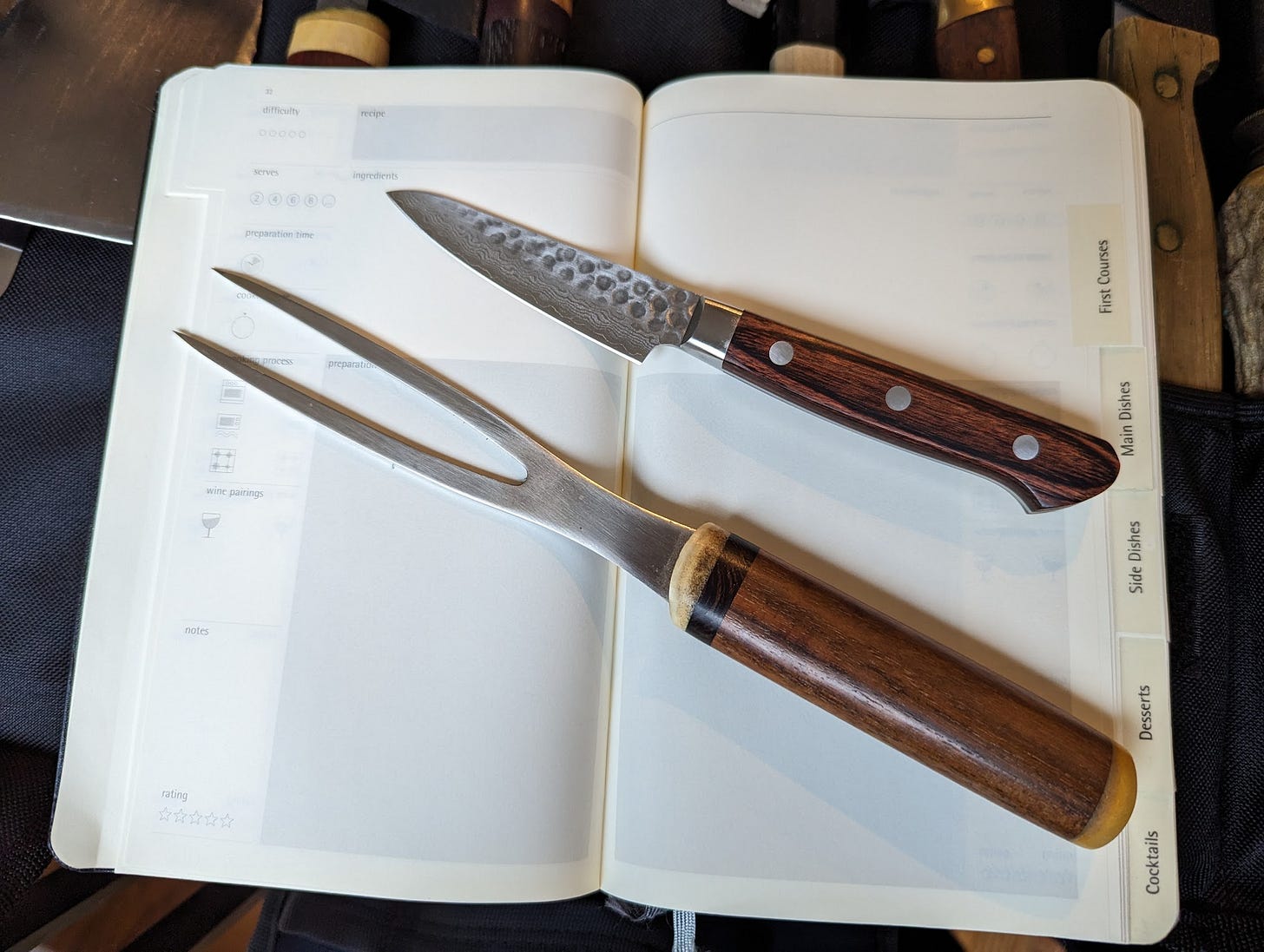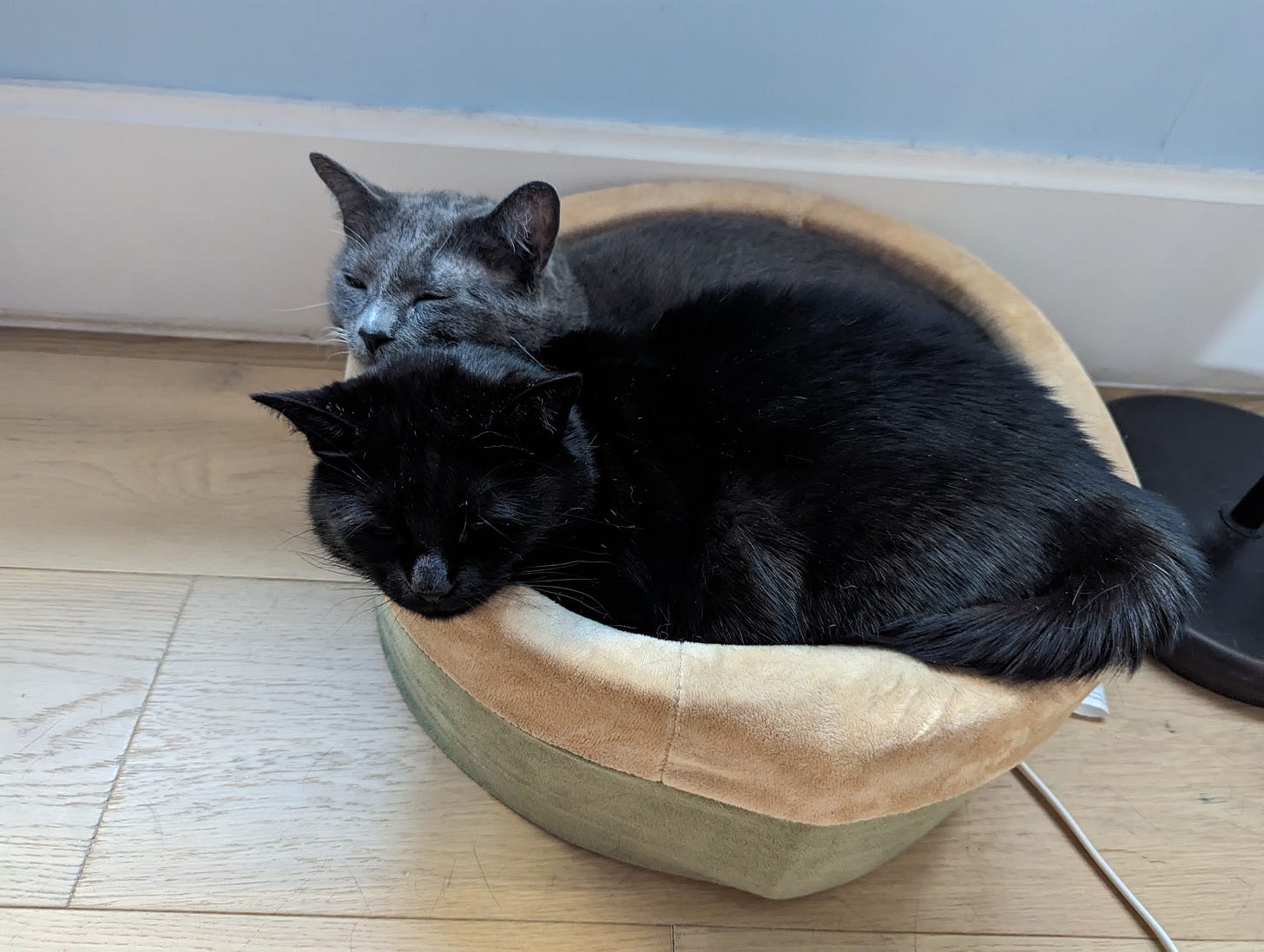Cooking is an act of editing. And as we (in the US) approach our most food-focused holiday this upcoming week, when even the least culinary inclined will reach for apron and spatula alike, that makes us all editors (however briefly).
Welcome back to the Cubicle At the End of the Galaxy. After a longer hiatus than intended - we’re taking a little detour into a sub-series I’m calling “Edited for Taste” which looks at the intersection of writing/editing/language/and food. Because when I’m not deep into making books, I’m often in the kitchen pouring over the same sorts of details about ingredients, techniques, and taste.
You may be wondering how cooking is an act of editing. You may also be wondering why it’s an act of editing and not writing. You may indeed be wondering where the heck is this newsletter - and analogy - going overall. All very fair. Let’s figure it out together.
Simply put, writing is an act of invention and editing is an act of modification. Cooking is also an act of modification, not invention. We take material that already exists: the ingredients and modify, revise, hone, transform, and shape them through the mechanics of cooking - applications of heat/cold, time, knife skills, mixing, kneading, etc - editing that material to a final composition.
Simply put, writing is an act of invention and editing is an act of modification. Cooking is also an act of modification.
But to edit anything, it has to first be written. And if writing is an act of invention, and yet we are not inventing anything when we cook, what part of cooking is writing? Well, that’s in the imagining, choosing, planning, and “contextualizing” of what to cook.
The context is what we invent when we write - a story, essay, etc. Taking existing material (words, phrases, tropes, themes, language writ large) and placing it all in a specific, new, and unique context.
And that’s what the planning and “deciding” before cooking is. Taking existing material (groceries, pantry ingredients) and placing them in a new context - the recipe from your favorite book or chef, the replication of a restaurant dish, the recreation of a cherished childhood memory, or the original idea you just have to try.
If you’re still not sold, consider the most essential mechanic of cooking - whether guided by recipe or not - tasting and adjusting. Adding a “little more of this” or “just a dash of that.” Noticing a change in the sound a dish is making and dialing up or down the heat. Reaching for a few springs of fresh herb at the end to freshen up the taste/look of a nearly finished dish. “Seasoning to taste” as nearly every recipe calls for. All of that is inherently an act of revision, of editing, and it takes place at every stage at every moment of cooking, not just at the end, and thus is definitional to the process.
“Tasting and adjusting” is exactly what editors do, reading, re-reading, poking at the language, and providing adjustments along the way. Suggesting additions or tweaks not part of the original plan or context. To put a fine point on it, we don’t cook for taste, we edit for taste.
So every time we step into the kitchen, we’re briefly all editors. Unless of course, we succumb to the paralysis/procrastination that can strike when deciding what to eat in the first place. At which point, take comfort. That just means you’re really a writer. Which is reason enough to be thankful on Thanksgiving. Because at least for one meal the writing’s been done for us.
Quick Cooking Tips
As part of these culinary diversions, I figure I can include some helpful tips for the kitchen. Nothing that requires you to buy anything or reconfigure your preferred way of cooking. A few of these are geared toward Thanksgiving (or other holiday) cooking, whether you’re leading the culinary show, or just hoping to help out a little bit.
Steeping can turn up the dial on nearly any recipe: Have a recipe that involves a liquid like milk, cream, or stock? Consider steeping some aromatics (herbs / whole spices) or other flavors in the liquid first. Like when making tea - just warm the liquid, add in your flavorings, and let it all simmer together ( 10 min is fine). Then strain and use the liquid as planned! Liquids are great for extracting flavors and evenly distributing them within a dish. Steeping can improve so many dishes creating maximum impact with minimal (one extra step!) effort.
My favorite steeping tip is to warm the butter/milk (or cream) that would be going into my mashed potatoes with some garlic cloves and whole herbs like thyme or rosemary, then pour that fragrant liquid over the potatoes and mash away to happiness.
Want to help, but don’t want to cook at a party? Cooks always appreciate a good “runner” Ferrying dishes to/from the kitchen. Grabbing another bag of stuff from the pantry or garage. Or the always noble and essential task of taking out another bag of garbage! Glamorous? No. Essential? Absolutely.
If you want to learn, ask. As hectic as holidays like Thanksgiving can be, if you are keen on learning, simply ask the cook to teach you. I’ve yet to meet a cook who didn’t love talking about food. Be as curious as you are hungry. And if it is hectic, maybe this can’t be a hands-on lesson - but one where you observe and ask questions. Just maybe offer to be a runner for them, as payment :)
Don’t stress over perfection - particularly at Thanksgiving. If things are a little overcooked, or just didn’t quite come together perfectly, don’t worry. Add a bit more gravy, have an extra slice of pie, and always remember that late-night snacks and takeout are even an option on holidays. Your guests are unlikely to notice, or care much when they are well nourished by good food and better company.
Reading Corner
Something new I’m trying - short lists of recommendations for reading, either on the topic of that particular newsletter or whatever happens to be catching my eye.
Some of my favorite books about writing + food:
*Will Write for Food by Dianne Jacob - A fascinating and “crunchy” guide to writing about food - for journalists/blogs/memoirs/etc, from a lifelong food writer and journalist.
*The Man Who Ate Everything by Jeffrey Steingarten - the first of two books of essays by the renowned food writer (and former Iron Chef judge). Even though published in 1997, the wit, curiosity, and daring remain as fresh as ever.
*What We Eat When We Eat Alone by Deborah Madison - Essays, interviews, stories (and a few recipes) looking at what people eat when we feed just ourselves. Odd, interesting, comforting, and wry. It unpacks a part of cooking/eating we all often experience, but seldom goes remarked about. (Special note: one of the stories in this book involves a former student of mine - and the niece of the author).
*Don’t Try This At Home by Andrew Friedman and Kimberly Witherspoon - a collection of stories from the world’s best chefs on the times when everything (and I mean everything) went wrong. Insightful, surprising, and an excellent reminder that even talented folks fail, and end up with great stories.
In the Next Dispatch from the Cubicle…
We continue to explore the wider weird world of book publishing. Starting with two entries answering questions posed by newsletter readers:
The first in a series of “how I edit books”
“IP publishing”: how books from your favorite brands and fandoms get made - where the stories and authors come from, and more.
And if you ever have questions, want to suggest topics, or want to help shape dispatches from the Cubicle in general, feel free to drop a question in the chat.
-Be Well.





